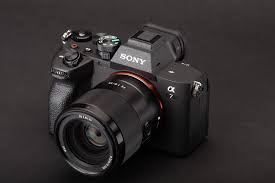Looking to capture stunning photos? The right camera can make all the difference. Whether you’re a budding enthusiast or a seasoned professional, the tools you use shape the results you get.
In 2025, the photography camera market is packed with powerful new models—from compact hybrids to advanced mirrorless systems. With AI-driven features, faster autofocus, and better image quality across the board, choosing the right one can feel overwhelming.
But picking the best camera is crucial. It directly affects your ability to shoot sharp, vibrant, and dynamic photos—whether you’re documenting travel adventures, shooting portraits, or working on commercial projects.
In this guide, we’ll break down the top photography cameras of 2025, highlight what makes each unique, and walk you through the key features to consider before buying.
Key Factors to Consider When Choosing a Photography Camera
Choosing the right photography camera isn’t just about price—it’s about how well the camera aligns with your goals, style, and experience level. Here are the most important factors to evaluate:
Sensor Size and Resolution
- Sensor types—like Full-frame, APS-C, and Micro Four Thirds—determine how much light your camera captures.
- Full-frame sensors offer better low-light performance, dynamic range, and depth of field.
- APS-C and MFT sensors are more compact and cost-effective, great for travel or casual shooting.
- Megapixels matter, but only up to a point. Look for a balance between resolution and sensor performance.
Lens Compatibility
- Your camera body is just one part of the equation—the lens system is equally important.
- Opt for camera ecosystems (like Sony E-mount, Canon RF, or Nikon Z) with a wide range of lens options.
- Interchangeable lenses give you flexibility for landscapes, portraits, macro, and beyond.
Autofocus Performance
- Modern autofocus systems use AI-based subject tracking, eye detection, and even animal recognition.
- Look for fast, accurate AF points and real-time tracking if you shoot sports, wildlife, or events.
- Test AF speed and precision in various conditions if possible.
Low-Light Performance
- A camera’s ability to shoot in low light depends on ISO range, sensor size, and noise reduction algorithms.
- Full-frame sensors generally handle high ISO better, resulting in cleaner night or indoor photos.
- Consider how often you’ll shoot in low light—this feature can make or break image quality.
Ergonomics and Handling
- A camera might be technically powerful, but if it’s not comfortable to hold, you won’t enjoy using it.
- Look for intuitive button placement, touchscreen controls, and grip comfort—especially if you shoot for extended periods.
- Smaller cameras are more portable, but larger models often offer better balance when using heavy lenses.
Top Photography Cameras of 2025
Best Overall Camera
Model: Sony α7 IV

DPReview
- Key Features: 33MP full-frame sensor, 4K 60fps video, 5-axis in-body stabilization, dual card slots
- Pros: Exceptional image quality, hybrid use for video and photography, robust lens ecosystem
- Cons: Premium price may be steep for beginners
- Price Range: ~$2,500
- Review Snippet: “The Sony α7 IV balances high resolution and impressive autofocus, making it a reliable workhorse for professionals and advanced users.” — RTINGS.com
Best Mirrorless Camera for Professionals
Model: Nikon Z6 III

- Key Features: 24.5MP full-frame BSI sensor, 6K video, 493-point phase-detection AF, dual processors
- Pros: Pro-level speed, exceptional build quality, great for hybrid shooters
- Cons: Slightly reduced dynamic range compared to competitors
- Price Range: ~$2,200
- Review Snippet: “The Nikon Z6 III is a compelling choice for those wanting pro features without Z9 pricing.” — WIRED
Best Budget-Friendly Camera
Model: Fujifilm X-S20

- Key Features: 26.1MP APS-C sensor, 6.2K video, Film Simulation modes, compact form factor
- Pros: Budget-friendly, superb JPEG output, excellent color science
- Cons: APS-C lens availability more limited than full-frame
- Price Range: ~$1,000
- Review Snippet: “The X-S20 is a fantastic lightweight travel companion with serious imaging capabilities.” — DigitalCameraWorld
Best DSLR Camera
Model: Canon EOS 90D

- Key Features: 32.5MP APS-C sensor, 4K video (uncropped), fast burst rate
- Pros: Sharp images, durable design, long battery life
- Cons: Larger body, not mirrorless future-proof
- Price Range: ~$1,200
- Review Snippet: “The EOS 90D remains a go-to DSLR for photography enthusiasts wanting tactile controls and fast performance.” — DPReview
Best Compact Camera for Street Photography
Model: Ricoh GR IIIx

- Key Features: 24.2MP APS-C sensor, fixed 40mm lens, built-in ND filter
- Pros: Incredibly portable, sharp prime lens, discreet design
- Cons: Fixed lens limits versatility
- Price Range: ~$1,050
- Review Snippet: “Perfect for everyday moments and street photography—small, sharp, and simple.” — PetaPixel
Best Camera for Beginners
Model: Canon EOS R50

- Key Features: 24.2MP APS-C sensor, 4K 30fps video, guided UI for beginners
- Pros: Intuitive menu system, lightweight, affordable mirrorless option
- Cons: Lacks in-body stabilization
- Price Range: ~$679 (body only)
- Review Snippet: “The Canon R50 is an ideal gateway for those stepping into mirrorless photography.” — TechRadar
Best Camera for Travel
Model: OM SYSTEM OM-5 (formerly Olympus)

- Key Features: 20MP Micro Four Thirds sensor, weather-sealed body, in-body IS, 4K video
- Pros: Ultra-compact, durable, loaded with computational photography tricks
- Cons: Smaller sensor size, less dynamic range
- Price Range: ~$1,200
- Review Snippet: “This lightweight mirrorless camera punches above its weight—perfect for travel and adventures.” — DPReview
Comparison Table – Best Photography Cameras of 2025
| Model | Sensor Type | Resolution | Video Capability | Price Range | Key Features |
| Sony α7 IV | Full-frame (BSI CMOS) | 33MP | 4K 60fps | ~$2,500 | Pro-level hybrid camera with IBIS and fast autofocus |
| Nikon Z6 III | Full-frame | 24.5MP | 6K | ~$2,200 | Pro AF system, rugged build, dual processors |
| Fujifilm X-S20 | APS-C | 26.1MP | 6.2K | ~$1,000 | Compact, budget-friendly, film simulations |
| Canon EOS 90D | APS-C | 32.5MP | 4K (no crop) | ~$1,200 | Classic DSLR, long battery, sharp photos |
| Ricoh GR IIIx | APS-C | 24.2MP | Full HD | ~$1,050 | Pocketable, fixed prime lens for streets |
| Canon EOS R50 | APS-C | 24.2MP | 4K 30fps | ~$679 | Entry-level, intuitive UI, lightweight |
| OM System OM-5 | Micro Four Thirds | 20MP | 4K 30fps | ~$1,200 | Weather-sealed, compact, IBIS |
Which Camera Is Right for You?
Choosing the best photography camera depends on your experience level, content needs, and budget. Whether you’re just starting out, creating videos for YouTube, or shooting professionally, there’s a perfect match for every type of user. Below are expert recommendations tailored to different use cases and search intents.
For Hobbyists & Beginners
- Best Camera for Photography Beginners
Top Pick: Fujifilm X-S20- Easy-to-use interface with intuitive controls
- Excellent JPEG color rendering with film simulations
- Affordable entry into the mirrorless ecosystem
- Also ideal as a lightweight travel camera or for personal use
For Content Creators & YouTubers
- Best Camera for Video and Photography for Beginners
Top Pick: Sony ZV-E1- Full-frame sensor optimized for video creation
- AI-powered autofocus and subject tracking
- Compact design with advanced video tools like background defocus
- Great for YouTubers, vloggers, content marketers
- Alternative: Sony α7 IV
- Better suited for creators needing high-end hybrid functionality for both photo and video
For Professional Photographers
- Best Camera for Professional Photography Beginners
Top Pick: Canon EOS R6 II- Full-frame mirrorless with 24MP resolution
- Up to 40fps burst shooting
- Excellent autofocus and in-body image stabilization
- Perfect entry point for serious amateurs or budding professionals
- Runner-Up: Nikon Z6 III
- Similar performance with Nikon’s system and lens advantages
Best Camera for Professional Photography and Videography
- Top Pick: Sony α7 IV
- 33MP full-frame sensor
- 4K video at 60fps
- Trusted for both studio photography and cinematic filmmaking
- Ideal for professionals who want one camera that excels in both disciplines
Best Affordable Camera for Photography
- Top Pick: Canon EOS R50
- Compact APS-C mirrorless camera
- Dual Pixel autofocus with subject detection
- 4K video, intuitive UI, and affordable lens options
- Excellent for students, hobbyists, and travel photography
Best Phone Camera for Photography
- Top Pick: Apple iPhone 15 Pro Max / Google Pixel 8 Pro
- Cutting-edge computational photography
- Manual controls and RAW shooting available
- Ideal for creators who prefer mobile workflows or want a high-quality secondary camera
Best Camera for Photography Beginners
Top Pick: Canon EOS R50
- Type: Mirrorless (APS-C)
- Why It’s Great for Beginners:
- User-friendly interface with guided menu and auto modes
- Compact and lightweight – easy to handle for new users
- Dual Pixel autofocus with subject tracking
- 4K video capabilities
- Affordable pricing for entry-level creators
Alternatives:
- Fujifilm X-S20 – More advanced but still beginner-friendly; great film simulations and color science
- Nikon Z30 – Great value, ideal for vloggers or hybrid shooters on a budget
Best Camera for Personal Use
Top Pick: Sony ZV-E10
- Type: Mirrorless (APS-C)
- Why It’s Ideal for Personal Use:
- Great for everyday shooting, vlogging, and social media content
- Compact and lightweight design
- Interchangeable lens system for flexibility
- Real-time Eye AF and background defocus button
- USB-C charging for easy travel
Other Options:
- Canon EOS M50 Mark II – Excellent for family moments, travel, and social sharing
- iPhone 15 Pro / Google Pixel 8 Pro – For those preferring mobile devices with top-tier photography features
Buying Guide: Digital Cameras
When you’re looking for the best digital camera, understanding a few key specifications will help you make an informed decision. Here’s a guide to the most important factors to consider when buying a digital camera.
1. Megapixels: How Many Megapixels Is a Good Quality Camera?
- Megapixels refer to the number of pixels in the image captured by the camera’s sensor.
- Recommended Range: For general use, a camera with 12-24 MP is sufficient for high-quality prints and social media sharing. Professional photographers often opt for cameras with higher megapixels, such as 30+ MP, for detailed shots and large prints.
2. Viewfinder: What Is a Viewfinder on a Digital Camera?
- A viewfinder is the small display that shows the scene you’re capturing. There are two types:
- Optical Viewfinder: Used in DSLR cameras, shows exactly what the lens sees through mirrors.
- Electronic Viewfinder (EVF): Found in mirrorless cameras, displays a digital image preview of the scene.
- Why It’s Important: It helps you compose shots, especially in bright conditions where the LCD screen may be hard to see.
3. Price: How Much Does a Digital Camera Cost?
- Budget Range: Basic point-and-shoot cameras start at around $100-$300.
- Mid-Range: For mirrorless or DSLR cameras, prices range from $500-$1,500 for good-quality models.
- Professional: High-end models with advanced features can cost $2,000-$5,000 or more.
4. Zoom: What Is the Difference Between Digital and Optical Zoom?
- Optical Zoom: Refers to the physical zooming of the camera lens to magnify the image without losing quality. Ideal for clear, sharp images.
- Digital Zoom: Crops the image digitally, which can reduce image quality, making it less ideal for professional use.
- Recommendation: Opt for cameras with optical zoom for better clarity in distant subjects.
5. Popular Brands: Canon, Sony, Nikon
- Canon: Known for its user-friendly interface, reliable autofocus, and high-quality lenses. Great for beginners and professionals alike.
- Sony: Offers a range of mirrorless and compact cameras with outstanding autofocus and video capabilities. Known for excellent low-light performance.
- Nikon: Provides strong DSLR cameras with excellent color reproduction and ergonomic designs. Ideal for serious photographers.
6. Resolution: What Is a Good Digital Photo Resolution?
- Good Resolution: A camera with a 20-30 MP resolution should be more than enough for everyday photography and printing photos.
- For large prints or professional work, you may want to go higher, but higher resolution doesn’t always mean better quality if other camera specs (like sensor size) are lacking.
7. Sensor: Which Camera Sensor Type Is Best?
- Full-Frame Sensors: These sensors offer the best image quality, providing excellent detail and low-light performance. Found in high-end cameras.
- APS-C Sensors: Common in mid-range cameras, offering a good balance of size, quality, and cost.
- Micro Four Thirds: Smaller sensors, typically found in entry-level cameras or compact cameras, offering less detail and poorer low-light performance but at a more affordable price.
8. Image Quality: Which Digital Camera Produces the Best Images?
- Best Cameras for Image Quality: Full-frame cameras like the Sony Alpha series, Canon EOS R series, and Nikon Z series are known for their superior image quality, especially in dynamic range, sharpness, and low-light performance.
- Additional Considerations: Camera lenses, aperture, and sensor size all contribute to the image quality.
9. Aperture: What Is a Digital Camera Aperture?
- The aperture controls the amount of light entering the lens and affects the depth of field (how much of the image is in focus). A wider aperture (f/1.8 or f/2.8) allows more light and provides a blurred background effect (bokeh).
- Recommendation: For portraits or low-light photography, a camera with a wide aperture (low f-number) is ideal.
10. Batteries: How Long Do Digital Camera Batteries Last?
- Battery life varies greatly depending on camera type and usage.
- Entry-Level Cameras: Typically last about 300-500 shots on a full charge.
- Mirrorless Cameras: Battery life can be shorter, ranging from 300-600 shots.
- DSLRs: These cameras can last 600-1,000 shots due to their optical viewfinders.
- Tip: Always carry a spare battery for long shoots or travel.
People Also Buy From:
- Sony: Known for their photo frames per second (FPS) and excellent movie FPS in 4K, ideal for action shots and cinematic content.
- Canon: Renowned for their overall image quality and robust professional camera bodies that elevate photography experiences.
- Ritz Camera: A trusted retailer for all camera gear needs, including digital cameras, DSLRs, lenses, and accessories from popular brands like Canon, Sony, and Nikon.
FAQ’s on Best Photography Camera
What is the best photography camera for beginners?
The Fujifilm X-S20 is ideal for beginners due to its ease of use, excellent JPEGs, and helpful auto modes.
Which is better: mirrorless or DSLR for photography?
Mirrorless cameras offer better video, are lighter, and have faster autofocus, while DSLRs are more rugged and offer longer battery life.
What makes a camera good for photography?
Key features include a large sensor, high resolution, good autofocus, interchangeable lenses, and manual control options.
Are full-frame cameras worth it?
Yes, especially for professionals and enthusiasts who need top-tier image quality and low-light performance.
What’s the best camera under $1000?
The Fujifilm X-S20 and Canon EOS R50 are strong contenders in 2025 for high value under $1,000.
Queries From Forums and People on Finding the Best Cameras for Photographers
Camera Recommendations for Music + Sports Photography
- Best Camera for Music Photography:
- Canon EOS 5D Mark IV: Excellent for low-light conditions (important in music concerts), fast autofocus, and high image quality.
- Sony α9 II: Fast continuous shooting speed, which is ideal for capturing fast-moving musicians and intense concert moments.
- Best Camera for Sports Photography:
- Nikon D6: Professional-grade camera with fast autofocus and high FPS (frames per second) for capturing action-packed moments.
- Canon EOS-1D X Mark III: Known for incredible autofocus speed, precision, and a high burst rate for action shots.
What’s the Best Camera for Filming AND Photography?
- Sony α7 IV: A highly versatile mirrorless camera that excels in both photography and 4K video recording. It features great autofocus for both stills and video.
- Canon EOS R6: Another solid choice for both video and photography, offering excellent image quality and great video capabilities in a compact mirrorless body.
Beginner Camera for Insect Photos
- Canon EOS Rebel T7: Great for beginners, with a solid 24.1MP sensor and good macro lens compatibility.
- Nikon D3500: Excellent for macro photography, with a user-friendly interface and good image quality at a budget-friendly price.
What Is a Really Good Photography Camera?
- Sony α7 III: Known for its excellent image quality, great autofocus, and dynamic range.
- Canon EOS R5: A top choice with incredible image quality, fast autofocus, and impressive video capabilities.
What Is the Best Camera for High-Quality Photography?
- Nikon Z9: Nikon’s flagship full-frame mirrorless camera with outstanding resolution, image quality, and speed.
- Canon EOS R5: Offers superb image quality, 8K video, and high dynamic range, making it one of the top contenders for high-quality photography.
Finding the Best Cameras for Photographers
- The best cameras for photographers depend on the type of photography, but here are some top options:
- Canon EOS R5: Ideal for professional photographers, offering superb image quality, fast autofocus, and 8K video.
- Sony α7R IV: Great for landscape, portrait, and studio photography with exceptional resolution (61 MP).
Wanting to Purchase a Camera to Start Photography, What Are Your Best Beginner Cameras?
- Canon EOS Rebel T7: Excellent for beginners, offering a simple interface, good image quality, and great lens compatibility.
- Nikon D3500: A great entry-level DSLR with easy handling and good image quality, perfect for those new to photography.
- Sony α6000: A mirrorless camera with fast autofocus and a compact body, ideal for beginners interested in upgrading to a mirrorless system.
What Camera Do Most Photographers Use?
- Canon EOS 5D Mark IV: Popular among professionals for its reliability, image quality, and versatility.
- Nikon D850: Known for its incredible resolution and dynamic range, this is a favorite among photographers who shoot landscapes, portraits, and more.
Which Type of Camera Is Best for Photography?
- DSLR Cameras: Offer excellent image quality, control over settings, and a wide range of lenses (e.g., Canon EOS 5D Mark IV, Nikon D850).
- Mirrorless Cameras: Offer compact designs and great autofocus systems, with excellent video capabilities (e.g., Sony α7 IV, Canon EOS R6).
What Is the Best Camera for All-Around Photography?
- Canon EOS R6: With superb autofocus, fast shooting, and excellent image quality, it’s great for all-around use—landscapes, portraits, events, and sports.
- Sony α7 III: A highly versatile mirrorless camera that offers a good balance of features for most photography styles.
What Is the Best Camera for People Photography?
- Canon EOS R5: Excellent autofocus and color science make it perfect for portrait photography.
- Nikon Z7 II: High resolution, great dynamic range, and excellent detail make it ideal for capturing fine details in portraiture.
Do Professional Photographers Prefer Nikon or Canon?
- Both brands have loyal followings, and the choice typically depends on personal preference.
- Canon is often preferred for its color science (natural skin tones) and autofocus performance.
- Nikon is loved for its dynamic range, resolution, and image quality, particularly in high-end models like the Nikon Z9.
Which Camera Has Better Photo Quality?
- Sony α7R IV: Known for excellent image quality, color accuracy, and resolution (61 MP).
- Canon EOS R5: Offers superb photo quality, excellent autofocus, and great color rendering.
Conclusion
Choosing the best photography camera depends on your goals, skill level, and budget. From beginner-friendly models to pro-grade powerhouses, 2025 has something for every photographer.
Now that you’re equipped with expert recommendations, it’s time to level up your photography. Browse our featured picks and find your ideal camera today!

